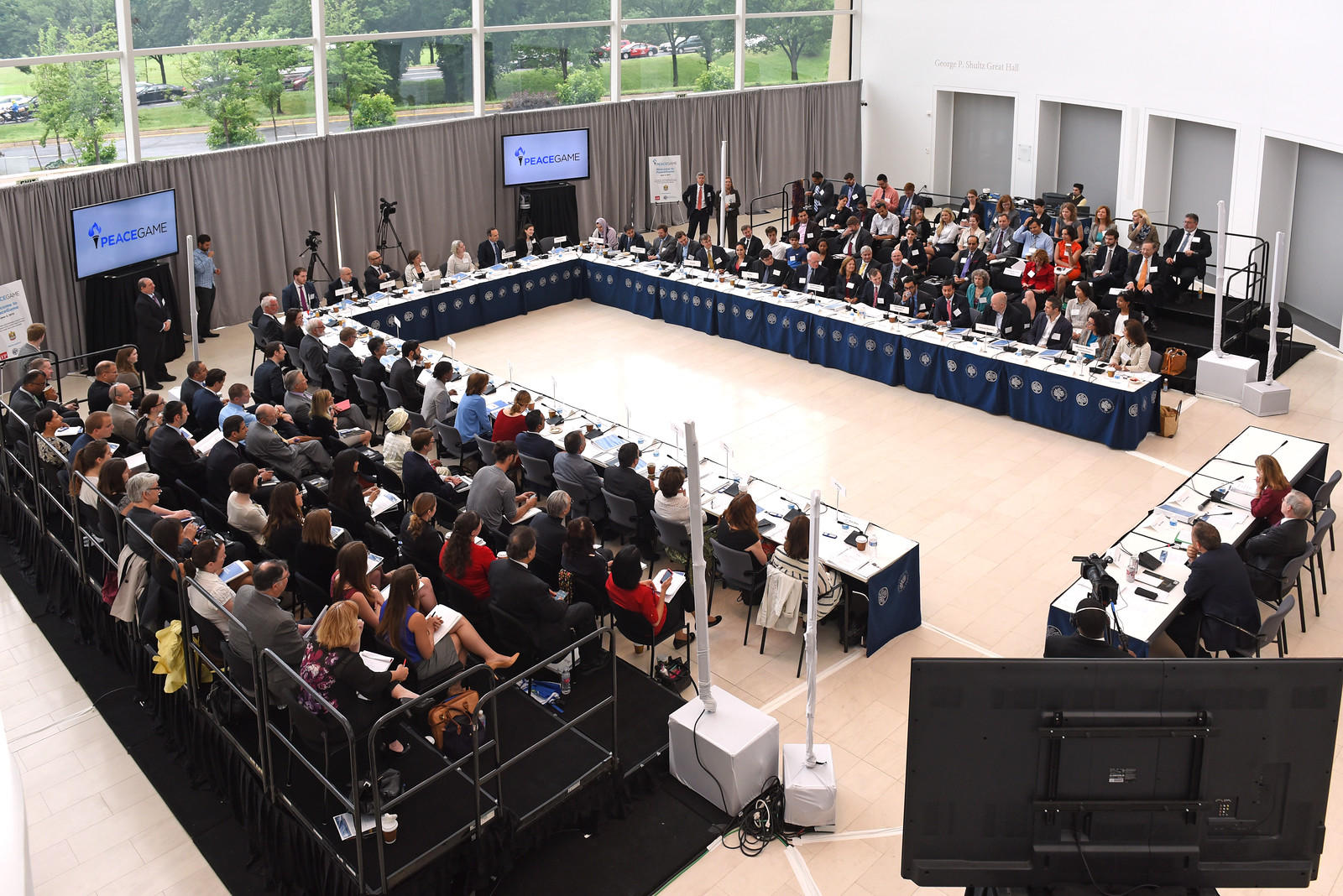Combating Extremism’s Contagion: Creating a Counter Strategy and Stemming the Tide of Foreign Fighters
The fourth biannual PeaceGame
Read the Event CoverageOn June 2, 2015, the U.S Institute of Peace and the FP Group, publisher of Foreign Policy magazine and foreignpolicy.com, hosted the fourth installment of PeaceGame. This PeaceGame tackled one of the most challenging of issues confronted by the U.S. government and stakeholders worldwide: the global rise of radical groups and violent extremism.

Building on a successful first session in December exploring the political and economic roots of extremism and violence, our June event will focus on the human element: why do today’s extremist movements attract recruits worldwide, and how can the international community more effectively both counter this appeal and manage the reintegration of radicalized individuals.
Employing PeaceGame’s innovative, scenario-based, multi-media model, our diverse group of participants will together work through the range of complex challenges around both the recruitment and the return of foreign fighters – from strategies to counter recruitment efforts to the risks and potential rehabilitation of fighters returning from conflict.
Agenda
7:30-8:30 a.m. Registration and Breakfast
8:30-8:45 a.m. Welcome and Introduction
David Rothkopf, CEO and Editor, The FP Group
Nancy Lindborg, President, United States Institute of Peace
8:45-9:45 a.m. Framing Discussion: “The Search for an Effective Counter Strategy”
9:45-10:00 a.m. Break and Refreshments
10:00-12:15 p.m. Scenario I: “What if They Gave a War and Nobody Came?: Commanding the Virtual High Ground and Other Strategies for Preventing and Defeating Information Age Insurgencies”
12:15-1:00 p.m. Lunch Break
1:00-2:00 p.m. Framing Discussion: “Offering Alternatives to Today’s Insurgents: Myths and Realities About What Works”
2:00-4:15 p.m. Scenario II: “Combatting Contagion: What’s Next for the Defeated or Homeward Bound Extremist?”
4:15-4:30 p.m. Break and Refreshments
4:30-5:15 p.m. Concluding Session: “Formulating Recommendations: Shaping Strategies and Setting Priorities”
5:15 p.m. Event Concludes
PeaceGame 2015 Participants
- H.E. Rouda Al Otaiba, UAE Ministry of Foreign Affairs
- Muath Al Wari, Washington, D.C.-based Middle East Analyst
- Graham Allison, Director, Belfer Center for Science and International Affairs, Harvard Kennedy School of Government
- Nada Bakos, Former CIA analyst
- BG Shlomo Brom, Center for American Progress
- Katherine Brown, King’s College of London
- Dan Brumberg, U.S. Institute of Peace (USIP)
- Mary Casey-Baker, The Arab Gulf States Institute in Washington
- Jocelyne Cesari, Georgetown University Berkley Center for Religion, Peace and World Affairs
- Leanne Erdberg, U.S. Department of State
- Masood Farivar, Voice of America
- Daveed Gartenstein-Ross, Foundation for Defense of Democracies
- Viola Gienger, U.S. Institute of Peace (USIP)
- Amb. Gordon Gray, Former U.S. Ambassador to Tunisia; now Deputy Commandant, National War College
- Stephen J. Hadley, Chairman of the Board, U.S. Institute of Peace
- Michael Wahid Hanna, The Century Foundation
- Simon Henderson, The Washington Institute
- Nicholas Heras, Center for a New American Security
- Georgia Holmer, U.S. Institute of Peace (USIP)
- Nkechi “Payton” Iheme, White House, Office of Science and Technology Policy
- Jorgen Ilum, Danish National Police
- James Jeffrey, Former U.S. Ambassador to Turkey
- Brian Michael Jenkins, RAND Corporation
- Emad Kiyaei, Princeton/American Iranian Council
- Nancy Lindborg, President, U.S. Institute of Peace (USIP)
- Sascha Meinrath, X-Labs
- Jonathon Morgan, CrisisNET
- Douglas Ollivant, New America Foundation
- Manal Omar, U.S. Institute of Peace (USIP)
- Farah Pandith, Former Special Representative to Muslim Communities, U.S. Department of State
- Tom Parker, United Nations Counterterrorism Implementation Task Force
- Thomas Pierret, University of Edinburgh
- Taufiq Rahim, Globesight
- Susan Reichle, U.S. Agency for International Development (USAID)
- Sarnata Reynolds, Refugees International
- David Rothkopf, CEO and Editor, Foreign Policy
- Tom Sanderson, Center for Strategic and International Studies (CSIS)
- Edit Schlaffer, Women Without Borders
- Barbara Slavin, The Atlantic Council
- Phillip Smyth, University of Maryland
- Thomas Staal, U.S. Agency for International Development (USAID)
- Lara Talverdian, The Atlantic Council
- Tomicah Tillemann, New America
- Rabih Torbay, International Medical Corps
- Gregory Treverton, Chairman, National Intelligence Council
- Lorenzo Vidino, has held positions at CSS, RAND, Belfer Center



